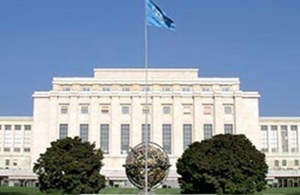Ministerial Pledging Conference on Resettlement and other forms of Admission for Syrian Refugees, 9th December 2014, Geneva
Statement delivered by Ambassador Karen Pierce on behalf of the British Government.

The Palais des Nations in Geneva
Thank you Mr Chairman,
High Commissioner, Distinguished Ministers, Colleagues,
I am pleased to be attending this Conference on behalf of the British Government and to reaffirm the UK’s commitment both to seeking actively an end to the conflict in Syria and to helping those who are suffering due to the crisis as well as our commitment to support the host countries. And let me at this point join other speakers in saluting the tremendous efforts the host countries are making.
The UK Government remains gravely concerned about the situation in Syria, the suffering and hardship it’s causing for millions of refugees, and the enormous strain it is placing on Syria’s neighbouring countries. This is undoubtedly a crisis of international proportions and it demands a fitting response from the international community. Member States of course decide how they can help those displaced by the crisis. We applaud those who have made offers of resettlement, changing the lives of those relocated.
The UK has an active resettlement programme - called Gateway - and we have run this for the past 10 years. We are proud to be one of the EU Member States offering the highest number of resettlement places through these programmes. Since the start of the Gateway programme we have resettled over 6,000 refugees to start a new life in the UK. We will continue to offer resettlement places through Gateway and our other programme, Mandate.
The UK believes that our own help is best targeted on providing substantial humanitarian aid. Through such aid we are already helping hundreds of thousands of refugees in the region get food, water, medical care and essential supplies. We are one of the biggest donors in humanitarian aid, second only to the United States as a bilateral donor. We have committed 700 million pounds/around $1 billion in response to the humanitarian crisis. We believe that humanitarian aid alongside actively seeking an end to the conflict are the best ways to ensure that the UK’s help has the greatest impact for Syrian refugees and their host countries. We intend to continue to focus on these priorities and we believe aid is the best way to support host countries and the majority of the 3.2 million displaced. As the panel and other speakers have noted today, not every IDP can be helped through resettlement. We will however continue to deliver on our commitment to resettle in the UK some of the most vulnerable refugees who cannot be supported effectively in the region as the crisis deepens.
Mr Chairman, let me say a word about this UK scheme which we launched in January and which is called the Syrian Vulnerable Persons relocation scheme or VPR. This scheme provides sanctuary in the UK for displaced Syrians who are most at risk and in particular priories help for survivors of torture and violence, women and children at risk and those in need of medical care.
The VPR is based on need not a quota. We envisage it will help several hundred people over the next 3 years. The first beneficiaries arrived in March, only 8 weeks after the scheme was launched. Between March and September, 90 individuals were granted Humanitarian Protection under the VPR scheme. This included a number of adults and children with very severe medical needs. Groups of Syrians are now being brought to the UK on a regular basis.
The VPR scheme has made a real difference to the lives of some of the most vulnerable displaced Syrians who can only be supported effectively outside the region by giving them protection, care and support in the UK. In such cases, resettlement is the only realistic solution.
I am pleased to tell this meeting that those who have arrived under the VPR so far are settling into their new homes and receiving the care they need. I look forward to our welcoming further families to the UK as the scheme progresses.
We must not however lose sight of the majority who remain in the region. Continuing our efforts to help them through aid remains the UK’s highest priority.
Thank you Mr Chairman